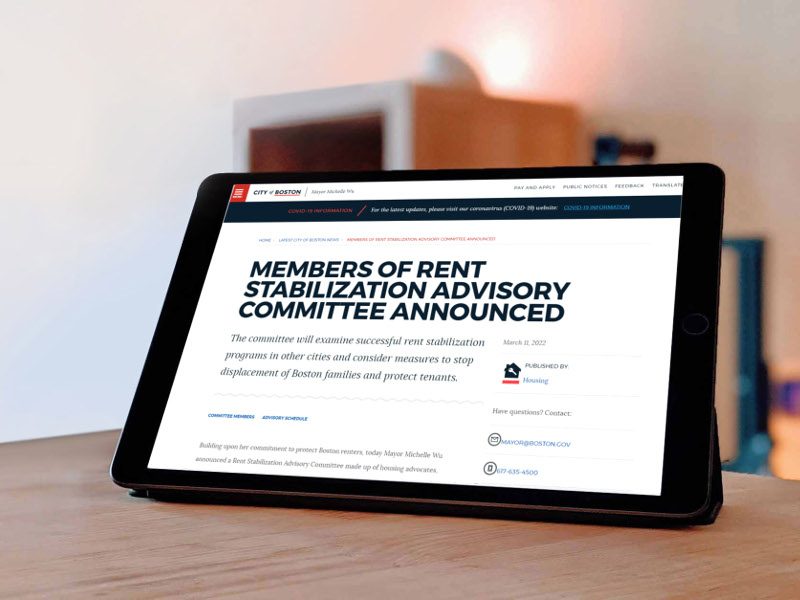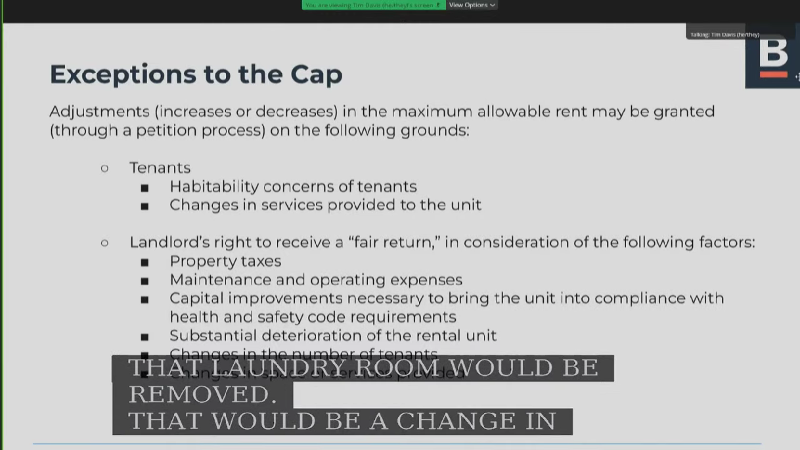MassLandlords, Inc., Sues City of Boston for Public Records Related to Mayor’s Rent Control Committee
| . Posted in News - 7 Comments
CAMBRIDGE, Mass.—After nearly a year of noncompliance by City of Boston administrators to provide public records ordered by the state Supervisor of Records in connection with the mayor’s Rent Stabilization Advisory Committee, MassLandlords, Inc., has filed a lawsuit in the Superior Court to enforce the Public Records Law and force the release of public information.

MassLandlords’ public records request sought to show how the Rent Stabilization Advisory Committee came to be announced with no small landlords represented. Derivative of image licensed by Unsplash.
The lawsuit was presented to the MassLandlords, Inc., board of directors on February 22, 2023, and was approved unanimously. The lawsuit was filed on February 24, 2023, by MassLandlords legislative affairs counsel Peter Vickery of Bobrowski & Vickery LLC, in Amherst, Mass.
MassLandlords, Inc., originally made a request, on March 28, 2022, to the City of Boston to provide email correspondence between the City and 23 individuals who were appointed to Boston Mayor Michelle Wu’s Rent Stabilization Advisory Committee (RSAC). The request sought the release of “all emails to, from, or cc’ing City email systems in connection with each of 23 committee members’ email addresses. (The RSAC has 25 members; two of the members’ email addresses were not available.) The request sought email records between the dates of March 11, 2021, and March 15, 2022, the year preceding the city’s announcement of the RSAC (on March 11, 2022).
In requesting the email records, MassLandlords sought to discern information regarding the manner, method and procedure supporting the appointment of the RSAC membership. The advisory committee had been charged with investigating and determining potential impacts on the City of Boston, and surrounding regions, of a return to rent control policies, which were banned statewide in 1994. The RSAC has since devised and proposed a Home Rule petition that would allow Boston to enact rent control policies in contradiction to state law Chapter 40P, which banned rent control.
The proposal is highly advantageous to RSAC members and member organizations. It was submitted to the Boston City Council on February 13, 2023. If approved by the city council, it would next go before the state legislature for approval.
On April 11, 2022, the city responded in a statement by its legal counsel that “representatives from the appropriate City departments” had been alerted to the public records request and an update would be provided once information is obtained.
On April 12, 2022, MassLandlords notified the state Supervisor of Records, who then contacted the City of Boston about the public records request. A nearly identical response from the City of Boston legal counsel followed on April 14: “Representatives from the Mayor’s Office” had been alerted regarding the public records request. An update would be provided once information is obtained.
On April 27, 2022, by which time still no records had been provided, the state Supervisor of Records ordered the City of Boston to comply. To that order, the city responded with: “invitations to the committee were extended via phone call” and that a single welcome email was sent to committee members on March 11, 2022. That email was shared with MassLandlords as supposed compliance, in total, with its original public records request for all email contact between the city and 23 RSAC members from March 11, 2021, to March 15, 2022.
MassLandlords contends that it stretches credulity to accept that there were zero emails exchanged between the City of Boston and 23 advisory committee members in the year leading up to the RSAC announcement. Some members are deeply involved with official city functions beyond the RSAC and would presumably, at least occasionally, correspond via email regarding those roles.
On May 12, 2022,the state Supervisor of Records issued a second, reiterated order for the city to provide requested email records. This order was ignored throughout the summer, until September 8, 2022, when the city notified MassLandlords that it had complied with its original public records request, referring to its April 27 response and the single email it provided welcoming RSAC members. The city has not stated there are no other emails, which, under the law, it would be obligated to do if it were true.

At the Boston City Council rent control hearing on Feb. 22, Tim Davis, Deputy Director of Research and Development, Office of Housing Stability showed how the cap can be disregarded by the rent control board. Public Domain.
Rent Control Impacts on Boston and Massachusetts
The mayor’s Rent Stabilization Advisory Committee has proposed a policy that, if approved for enactment by the city council, state legislature and Governor Healey, would have profound impacts on Boston and the state.
A rent control board would prohibit most rental property owners in the city from increasing rent in accordance with inflation and markets. The use of a consumer price index is a distraction. At the February 22 hearing of the city council Committee on Government Operations, Tim Davis, deputy director of research and development for the Wu administration, showed how the CPI would be overridden by the board. Under this system, many landlords would be unable to procure adequate funding for maintaining upkeep in compliance with the state’s sanitary code, let alone updating for energy efficiency and other necessary improvements.
The RSAC rent control proposal closely matches previously repealed rent-control policies that had a disparate impact, disproportionately favoring white, well-off renters. For example, while 22% of residents in Cambridge during the rent control years were people of color, only 8% of rent-controlled units were leased to people of color. Too often, rent-controlled dwellings were monopolized by relatively wealthy renters, such as Cambridge Mayor Ken Reeves and Judge Ruth Abrams. The RSAC proposal includes no provisions to avoid repeating such perverse outcomes.
RSAC representation largely consists of well-connected individuals in Boston, primarily representing for-profit and nonprofit developers. For example, 17 of its 25 members have been personal contributors to Massachusetts political campaigns. Meanwhile, the committee has not one residential landlord, many of whose businesses would be severely harmed by the mayor’s proposal. Whereas the proposal would grant developers a 15-year exemption from rent control following ground-up renovation, the form of “gut renovation” practiced by landlords would not be exempted, and worse, would not be permitted without approval from the rent board.
It is essential that the appointment of the RSAC be a transparent process, with ample allowance for public input and commentary from renters and residential landlords, not just for-profit and nonprofit developers. Enforcing compliance with its public records request for email correspondence with RSAC appointees is part of that campaign for transparency.
All correspondence in connection with this public records request is available for review by request.
MassLandlords, Inc., is a nonprofit, member-governed association based in Cambridge that seeks to create better rental housing in Massachusetts by helping landlords operate sustainable, compliant and quality businesses.
- Why do landlords need permission to make major repairs, but developers can tear down your building and then get exempted from rent control for 15 years?
- Why were wealthy and well connected developers the main members on the Rent Stabilization Advisory Committee?
- Why does the mayor want her proposal instead of Chapter 40P rent control that would help renters immediately?
- Who really benefits from this?
- Why can't we see who asked for this?






